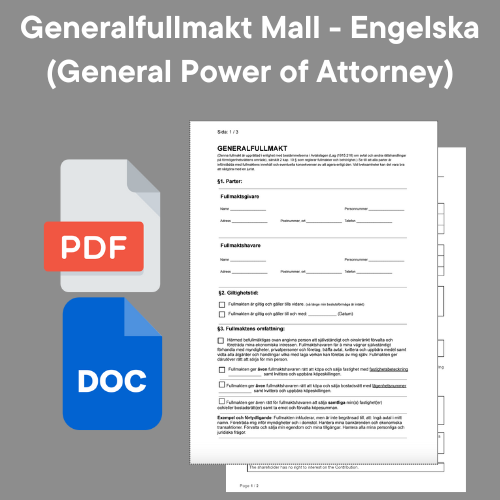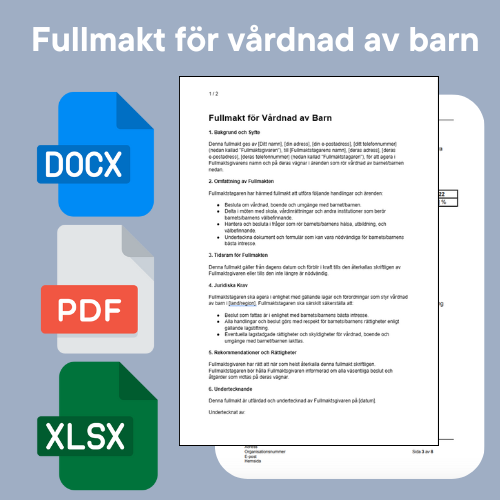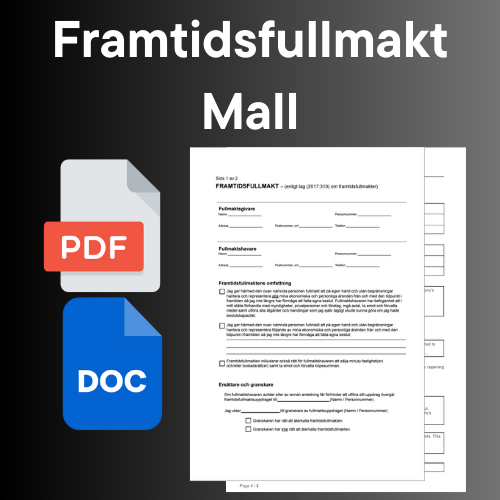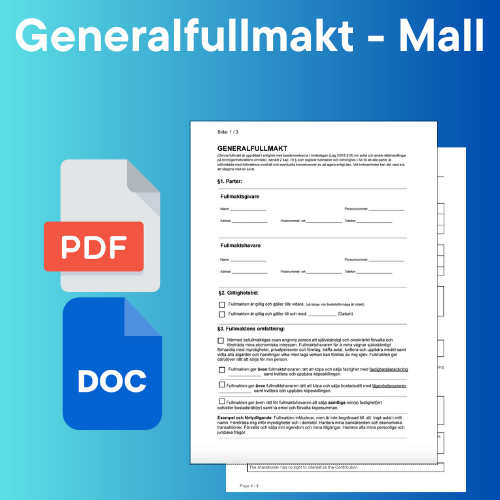What type of power of attorney is right for me?
Share
What type of power of attorney is right for me?
Introduction
Choosing the right type of power of attorney can be critical in ensuring that your interests and needs are properly represented. There are different types of powers of attorney that are tailored to specific situations and needs. This guide will provide a comprehensive overview of the different types of powers of attorney, their uses, how to create them, and common mistakes to avoid. We will also look at what the law says about powers of attorney and what legal practice looks like.
Table of Contents
- What is a power of attorney?
-
Types of powers of attorney
- Future power of attorney
- General power of attorney
- Power of attorney for specific matters
- Power of attorney for court and authority matters
- Power of attorney to represent limited companies
- Power of attorney to represent a condominium association
- Power of attorney to the other parent
- Power of attorney to the Swedish Migration Agency
- Power of attorney for relative
- Power of attorney for car/vehicle
- Transport authorization
- Power of attorney to sell movable property
- Power of attorney for estate
- Power of attorney to buy shares
- Power of attorney to sell shares
- Power of attorney for apartment
- Power of attorney for legal representative
- Power of attorney
- Power of attorney for non-profit association
- Power of attorney for purchasers of condominiums
- Power of attorney for deceased estate owners
- Power of attorney for finances
- Power of attorney for annual meeting in non-profit association
- Power of attorney for annual general meeting in housing association
- Power of attorney for travel with children
- General power of attorney for limited liability companies
- Power of attorney for car purchase
- Revocation of power of attorney
- What does the law say about powers of attorney?
- Frequently asked questions about powers of attorney
- Implementation of Powers of Attorney
- Common mistakes to avoid
- Conclusion
What is a power of attorney?
A power of attorney is a written or oral agreement where a person (power of attorney) gives another person (power of attorney) the right to act in the power of attorney's name. Powers of attorney are used in many different contexts and can be general or specific depending on what they are to be used for.
Types of powers of attorney
1. Future power of attorney
A future power of attorney is a power of attorney that is intended to be used in the future if the grantor becomes unable to take care of his own affairs due to illness, accident or old age. This type of power of attorney comes into effect when the person giving the power of attorney can no longer make decisions himself.
Areas of use: Managing finances, paying bills, decisions about housing and care.
Example: If a person develops dementia, the appointed power of attorney can use the future power of attorney to manage that person's financial and personal affairs.
2. General power of attorney
A general power of attorney gives the power of attorney the right to perform almost all legal acts that the power of attorney can do. It is very broad and is most often used when the power of attorney wants to give extensive powers to someone else.
Areas of use: Daily management of financial and legal matters, real estate transactions, banking matters.
Example: A businessman who travels a lot can give a general power of attorney to his partner or attorney to handle all business and financial transactions in his absence.
3. Power of attorney for specific matters
A power of attorney for specific matters is limited to one or more specific tasks. The power of attorney specifies exactly what the power of attorney is allowed to do.
Areas of use: Single real estate deals, specific bank transactions, negotiations on a specific contract.
Example: A person who cannot be present at the sale of his house may give a specific power of attorney to a friend to conduct the sale.
4. Power of attorney for court and authority matters
This type of power of attorney gives the power of attorney the right to represent the power of attorney in legal and administrative matters before courts and authorities.
Areas of use: Litigation, tax matters, migration matters.
Example: A person who has an ongoing legal dispute but lives abroad can give a power of attorney to a lawyer to represent them in court.
5. Power of attorney to represent limited companies
Such a power of attorney gives a person the right to represent and make decisions for a limited company. This may include signing contracts, managing financial transactions and other administrative tasks.
Areas of use: Board meetings, shareholders' meetings, business agreements.
Example: A CEO who needs to travel can give a general power of attorney to a deputy CEO to ensure that the company can be run smoothly in his absence.
6. Power of attorney to represent the condominium association
This power of attorney is used to give someone the right to represent a condominium association in various contexts, for example at general meetings or during negotiations.
Areas of use: Annual General Meeting, negotiations on maintenance work, legal matters.
Example: The chairman of a condominium association can give a power of attorney to another member to represent the association at an important meeting about construction work.
7. Power of attorney to the other parent
A power of attorney to the other parent is used when one parent wants to give the other parent the right to make decisions in matters concerning their child.
Areas of use: School errands, healthcare, traveling with children.
Example: A parent traveling abroad can give a power of attorney to the other parent to handle all school and care-related matters during the trip.
8. Authorization to the Swedish Migration Agency
This type of power of attorney gives someone the right to represent a person in matters with the Swedish Migration Agency.
Areas of use: Applications for residence permits, citizenship, work or studies.
Example: A person applying for a residence permit can give a power of attorney to a friend or a legal representative to represent them in contacts with the Swedish Migration Agency.
9. Power of attorney for next of kin
A power of attorney for next of kin is used when a person wants to give a close relative the right to manage various affairs.
Areas of use: Financial matters, care decisions, everyday decisions.
Example: An elderly person who can no longer manage his banking affairs can give a power of attorney to an adult child to handle payments and other financial matters.
10. Power of attorney for car/vehicle
Such a power of attorney is used when someone else is to buy, sell or handle matters relating to a vehicle on behalf of the person giving the power of attorney.
Areas of use: Buying and selling cars, vehicle registration, workshop visits.
Example: A person who cannot attend the sale of his car can give a power of attorney to a friend to carry out the sale.
11. Transport authorization
Transport powers of attorney are used to give someone the right to handle transport-related matters, such as shipping, logistics and deliveries.
Areas of use: Import and export of goods, management of logistics.
Example: A company that imports goods can give a transportation power of attorney to a logistics partner to handle all shipping-related issues.
12. Power of attorney to sell movable property
This power of attorney gives someone the right to sell movable property belonging to the power of attorney.
Areas of use: Sale of furniture, electronics, personal belongings.
Example: A person moving abroad can give a power of attorney to a friend to sell their furniture and other belongings.
13. Power of attorney for estate
A power of attorney is used to give someone the right to manage an estate, including selling property and paying debts.
Areas of use: Administration of the estate, sale of the assets of the estate, payment of debts.
Example: After a person's death, a relative can receive a power of attorney to manage the estate and its assets.
14. Authorization to purchase shares
This power of attorney gives someone the right to buy shares on behalf of the power of attorney.
Areas of use: Investment purposes, stock trading.
Example: An investor who cannot monitor the market at all times can give a power of attorney to a stockbroker to buy shares in their name.
15. Power to sell shares
Such a power of attorney gives someone the right to sell shares on behalf of the power of attorney.
Areas of use: Sales of investments, stock trading.
Example: An investor who travels can give a power of attorney to a stockbroker to sell shares at the right time.
16. Power of attorney for apartment
This power of attorney is used when someone needs to represent another person in matters concerning an apartment.
Areas of use: Lease contract, sale of apartment, rental.
Example: A person moving abroad can give a power of attorney to a friend to manage the lease or sell the apartment.
17. Power of attorney for legal representative
A power of attorney gives a lawyer or other legal representative the right to act on the grantor's behalf in legal matters.
Areas of use: Litigation, legal advice, contract negotiations.
Example: A person involved in a legal dispute can give a power of attorney to their legal representative to handle all legal matters.
18. Power of attorney
This type of power of attorney is used when someone else is to be assigned custody of a child temporarily or permanently.
Areas of use: Care of children, decisions about school attendance, care.
Example: A parent who is ill can give a guardianship power of attorney to a relative to take care of the child during the period of illness.
19. Power of attorney for non-profit association
A power of attorney for a non-profit association is used to give someone the right to represent an association in various contexts.
Areas of use: Association meetings, legal matters, financial decisions.
Example: A chairman of a non-profit association can give a power of attorney to another board member to represent the association at an important meeting.
20. Power of attorney for purchasers of condominiums
This power of attorney gives someone the right to represent the buyer of a condominium in the purchase process.
Areas of use: Purchase agreements, negotiations, financing.
Example: A buyer who cannot be present at the signing of the purchase contract can give a power of attorney to his lawyer or broker.
21. Power of attorney for deceased co-owners
Such a power of attorney gives a co-owner of the estate the right to represent the estate in various matters.
Areas of use: Administration of the estate, sale of assets, inheritance.
Example: A co-owner who lives abroad can give a power of attorney to another co-owner to manage the estate.
22. Power of attorney for finances
This power of attorney gives someone the right to handle financial matters for the person giving the power of attorney.
Areas of use: Paying bills, banking, investments.
Example: An elderly person who finds it difficult to manage his banking affairs can give a power of attorney to a relative to manage the finances.
23. Power of attorney for annual meeting in non-profit association
Such a power of attorney is used to give someone the right to represent a member at an annual meeting of a non-profit association.
Areas of use: Voting rights, decisions on association issues.
Example: A member who cannot attend the annual meeting can give a proxy to another member to vote on their behalf.
24. Power of attorney for the annual general meeting in a condominium association
This power of attorney gives someone the right to represent a condominium owner at the annual general meeting of a condominium association.
Areas of use: Voting rights, decisions on association issues, budget.
Example: A condominium owner who cannot attend the annual general meeting can give a power of attorney to a neighbor to vote on their behalf.
25. Authorization for travel with children
This power of attorney is used when a parent wants to give someone else the right to travel with their child.
Areas of use: Foreign trips, school trips.
Example: A parent who cannot accompany the child on a school trip can give a power of attorney to another parent or relative to accompany the child.
26. General power of attorney for limited liability companies
A general power of attorney for a limited company gives a person extensive powers to act for a limited company in all matters that are not specifically limited.
Areas of use: Strategic decisions, financial transactions, legal issues.
Example: A CEO can give a general power of attorney to a manager to handle day-to-day business operations.
27. Authorization for car purchase
This power of attorney gives someone the right to buy a car on behalf of the power of attorney.
Areas of use: Purchase of vehicles, negotiations with car dealers.
Example: A person who cannot attend the car purchase can give a power of attorney to a friend or relative to carry out the purchase.
28. Revocation of power of attorney
A revocation of power of attorney is a written document in which the giver of power of attorney revokes previously given power of attorney.
Areas of use: When the person giving the power of attorney wants to terminate the power of attorney.
Example: If the authorizer no longer trusts the authorized holder or if the authorized assignment has been completed.
What does the law say about powers of attorney?
In Sweden, powers of attorney are regulated by the Contracts Act (Act (1915:218) on contracts and other legal documents in the area of property law). According to the law, a power of attorney can be both written and oral, but for certain types of legal documents a written power of attorney is required.
Important aspects of the law:
- Will of the power of attorney: The power of attorney must clearly express the will and powers of the power of attorney.
- Scope of the power of attorney: The power of attorney holder may only perform the actions specified in the power of attorney.
- Revocation: The power of attorney can be revoked at any time by the person giving the power of attorney, provided that this is communicated to the power holder and any third parties.
Frequently asked questions about powers of attorney
-
What happens if the authorized person abuses his authority?
If the holder of the power of attorney abuses his authority, the power of attorney can revoke the power of attorney and, if necessary, take legal action. The authorizer can also demand compensation for any damages.
-
How long is a power of attorney valid for?
A power of attorney is valid until revoked by the power of attorney or until a predetermined date or event occurs. It is important to specify the validity period in the power of attorney.
-
Can I give several people power of attorney for the same matter?
Yes, it is possible to give several people power of attorney for the same matter. However, it is important to clearly state the powers and responsibilities of each proxy holder to avoid conflicts.
-
Does a power of attorney have to be witnessed?
Certain types of powers of attorney, such as future powers of attorney, require the power of attorney to be witnessed by two independent witnesses. For other types of powers of attorney, it is not necessary but may be beneficial to avoid future disputes.
-
Can I revoke a power of attorney at any time?
Yes, a power of attorney can be revoked at any time, as long as the revocation is communicated to the power of attorney and any third parties affected by the power of attorney.
Implementation of Powers of Attorney
To create a power of attorney, you need:
- Determine the type of power of attorney you need.
- Clearly state the powers of the proxy holder.
- Specify the validity period of the power of attorney.
- If necessary, have the power of attorney witnessed by independent witnesses.
- Hand over the power of attorney to the authorized holder and inform any third parties.
Common mistakes to avoid
- Ambiguity: The power of attorney must be clear and specific about the powers of the power of attorney.
- Lack of witnessing: Some powers of attorney must be witnessed to be valid.
- Not specifying validity period: Without a clear validity period, problems may arise when revoking the power of attorney.
- Not informing third parties: It is important to notify any third parties of the power of attorney and its scope.
Conclusion
Choosing the right type of power of attorney is critical to ensuring that your interests and needs are properly represented. By understanding the different types of powers of attorney, their uses, and what the law says, you can make informed decisions and avoid common mistakes. Whether you need a future power of attorney, general power of attorney, or a power of attorney for specific matters, it is important that you carefully consider your options and create a power of attorney that meets your specific needs.




